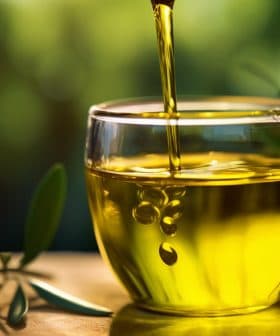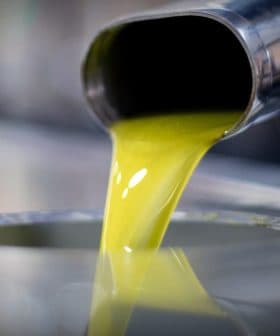Patent Bid Showcases Oleocanthal’s Versatility
The compound oleocanthal found in extra virgin olive oil has potential as an anti-inflammatory and antioxidant, with applications in treating diseases such as Alzheimer’s and cancer. Monell Chemical Senses Center is seeking a worldwide patent for oleocanthal and is continuing research on its potential health benefits, including its role in inflammation, Alzheimer’s disease, and cancer treatment.

Oleocanthal — the part of extra virgin olive oil that stings the throat — is a marketing opportunity yet to be tapped, according to the American research center that isolated and named it.
Monell Chemical Senses Center Director of Technology Transfer, Mark Friedman, says the potential of the compound just keeps growing.
“Inflammation is a component of so many diseases and conditions that the potential as an anti-inflammatory alone is enormous. There is much exciting research being done on oleocanthal’s health effects, and not just at Monell,” he said.
“We believe oleocanthal is a commercially valuable opportunity waiting to happen. All it would take is the right commitment and investment.”
Serendipitous discovery
Olive oil is ancient but oleocanthal was discovered relatively recently.
Philadelphia-based Monell started down the path after its director, Gary Beauchamp, sipped fresh extra-virgin olive oil while in Sicily in 1999 and noticed the sting he felt in his throat was like a liquid form of nonsteroidal anti-inflammatories (NSAIDs) he had swallowed during sensory studies.
Collaborating with the nearby University of Pennsylvania, the scientists later isolated the natural agent they believed was responsible — deacetoxydialdehydic ligstroside aglycone, one of many polyphenols in olive oil — and found that a synthetic version of it produced the same throat irritation. It was named oleocanthal: oleo=olive; canth=sting; al=aldehyde.
Monell filed for a U.S. federal trademark registration for Oleocanthal in 2005 but did not proceed with it.
International patent sought
Now the University and Monell are seeking a worldwide patent and their application showcases a wide range of uses for the compound.
Though titled “Oleocanthal for treating pain,” the patent application, published in April by the World Intellectual Property Organization, claims oleocanthal can also be used as an anti-inflammatory for treating or preventing many diseases, including Alzheimer’s, and as an anti-oxidant to fight cancer and promote wound healing.
“The invention relates to the active principal in olive oil, termed oleocanthal, and methods of using oleocanthals in various formulations including, food additives, pharmaceuticals, cosmetics, animal repellants, and discovery tools for mammalian irritation receptor genes, gene products, alleles, splice variants, alternate transcripts and the like,” it says.
Oleocanthal can make inferior oils taste like extra virgin olive oil
First in the “Uses of Oleocanthals” section of the application is “as a food additive”, and an aspect that some in the fraud-prone olive oil sector might find unsettling.
“The oleocanthals of the invention provide the characteristic irritation sensation found in premium olive oils. The oleocanthals may be added to lower grade oils to provide for an oil that tastes like premium extra virgin olive oil,” it says.
Friedman told Olive Oil Times that the application published this year dated back to an initial filing in 2006. Since then, the large number of patent claims in the original application had been split by patent examiners into smaller groups covering different aspects of the invention.
“What will be patented is different from this original application.”
“Going forward, Monell has no plans and no interest in pursuing patent claims directed to the use of oleocanthal as a flavor compound.”
“We are a non-profit organization with a responsibility to contribute to the public good and want to focus on the health benefits of oleocanthal,” he said.
Myriad uses for oleocanthal
Oleocanthal can be extracted from olives or extra virgin olive oil, but Friedman said the highest concentrations are found in the latter. A method of making synthetic oleocanthal — from the inexpensive and readily available simple sugar D‑ribose — is also described in the patent application and he said a patent might also be sought for the method.
Among the uses Monell claims for oleocanthal are:
- Food additive: oleocanthal be used to enhance food flavor and inhibit sweetness, and as an irritant to add to “gastronomic experience” in a similar way to chili and Szechwan pepper. It can also add to the “sensory-irritation experience” of products such as toothpaste, mouthwash, and lozenges.
- Preservative: oleocanthal’s anti-bacterial and antifungal properties allow it to act as a preservative, such as to coat food before packaging or be applied to food packaging to prevent spoilage.
- Cold and flu aid: oleocanthal can be used to treat cold or flu symptoms, including as counter-irritants for sore throats and in nasal decongestants.
- Antioxidant: because oleocanthal is believed to have anti-oxidant activity it can also be used to treat or prevent various conditions including cancer, to promote wound healing, and used to provide oxidation stability in cosmetics.
- Pain relief: useful for pain relief associated with conditions including influenza or other viral infections, common cold, low back and neck pain, dysmenorrhea, headache, toothache, sprains and strains, burns and arthritis.
- Anti-inflammatory: as an agent for treating or preventing diseases marked by inflammation.
- Treatment or prevention of the development of Alzheimer’s associated brain plaques: it is believed that like ibuprofen, oleocanthal inhibits micro‑G proteins and associated kinases.
- For oral surgery and oral irradiation treatment of cancer: as an oral rinse to inhibit inflammation from surgery or oral irradiation.
- Animal repellent: including to repel domestic cats, rodents, raccoons, dogs, and coyotes, and to deter birds from using non-potable liquids such as waste water and freestanding water on airport runways, parking lots, etc.
Research continues on treating inflammation, Alzheimer’s disease and cancer
Friedman said he was not aware of any such oleocanthal-based applications already on sale.
“Monell is not a commercial enterprise and we depend on businesses and entrepreneurs to take our inventions to market,” he said.
Meanwhile, the center is continuing to explore oleocanthal’s role as an anti-inflammatory, in preventing and treating Alzheimer’s disease, and in cancer treatment.
Monell scientist Paul Breslin said in vitro oleocanthal had been shown to have “anti-inflammatory properties on enzymes, cells, and tissues, to interfere with formation of Alzheimer peptides and oligomers — namely Tau and Abeta, and to kill cancer cell lines as well as not kill healthy cell lines.”
“We are continuing our interests in all three areas and are working on Abeta and cancer cells,” he said.
“There is room there to explore vascular health and the role dietary oleocanthal may play in this regarding heart disease, strokes and other vascular diseases, but we are not there just yet.”
“It is a rapidly growing field of translational and medical research and is very exciting for its current promise given the results that we are seeing,” Breslin said.









